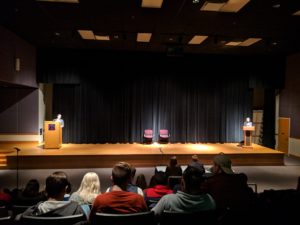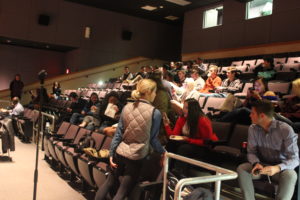Media edited by Travon Ricketts
Student Government Association voting starts today, March 19 and closes at midnight on Tuesday, March 20. Polling stations are located in the UC, in the dining halls and in the Health and Human Sciences Building. Students can also vote online through their email.
Prior to the election, SGA held WCU’s first presidential debate on Monday, March 12.
The lights dimmed and a hush fell over the small crowd as the moderator began to speak. The excitement about the first SGA at WCU debate between candidates for the title of Student Body President in the last three years enraptured everyone.

Matthew Opinski (left) and Katherine Spalding (right) on stage for SGA Presidential Debate
With finger-food at the ready, the crowd of around 50 students and staff anxiously awaited the beginning of the debate on March 12.
On the right, current SGA president, Katherine Spalding. She has had a year of defeats and accomplishments, but she intends to only improve if she becomes re-elected. Spalding attended state conferences where she met other student leaders of the 17 sister campuses and saw the potential to adopt some of the policies they have implemented.
“I ran knowing that one year was not enough to fix these internal failures and external ineffectiveness,” said Spalding. “I am running again to fulfill my promise to continue fighting for what is right and make SGA what it should have been the minute students chose WCU as their home.”
And to the left, current Associations of Student Government liaison and ex officio member of SGA’s senate, Matthew Opinski. Eager to fill her shoes, Opinski was ready to provide his ideas and promises to the student body. “We have been poisoned by a year of stagnancy in SGA and on our campus as a whole – whether it be with social issues, mental health and healthier food options” said Opinski.
“After all Western has provided me, I felt obligated to give back and make the changes that this institution so much deserves,” said Opinski. Many of his ideas stem from implementing ‘task forces’ that work individually on fixing issues on and around campus.

A great turnout for the debate!
Many of the questions asked during the debate were centered around the racial issues that are occurring on and around campus. Spalding suggested that she have a sit-down meeting with representatives from each minority group on campus and speak to each of them and garner ideas and thought about what needs to change and how.
Opinski suggested a task force made up with student representatives to fix the issues concerning racial disparities within student life at Western. He also suggested similar task forces to address other issues like including mental health and food options.
After the initial questions were asked, the moderator opened up the floor for student questions. Each student that signed up to ask a question before the debate was called on to speak into a microphone and address either candidate.
David Rhode, a sophomore and business major was the first to go up to the microphone with his question.
Listen to the student’s questions part of the debate below.
After the debate, Rhode said that both candidates handled themselves well.
“When engaging in political communications, it is always important to remain respectful and attentive to everyone involved,” continued Rhode. “Quite honestly, low-balled and side swiped attempts to attack a candidate in the form of a question – which is really just opinionated – is not necessary and has no place in a University SGA,” said Rhode in response to Matt Smart’s question.
Some of the students in the audience had yet to be impressed. Rena Dawkins, a member of WCU’s Pride of the Mountains Marching band, had doubts about whether or not the candidates would fulfill their promises to address social injustices around campus.
“I would like to see them put their money where their mouth is,” said Dawkins.
To listen to the full debate, click on video below.



